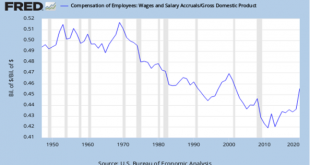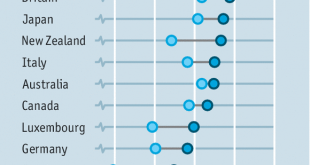from Geoff Davies and RWER Yet consider a model of the Global Financial Crisis of 2007-8 by Eggertsson and Krugman (2012), the latter a pseudo-Nobel prize winner. They made two models, one for before and one for after a crash, with the difference between the models being effectively that the amount of available credit was presumed to be less in the second. Nothing in the model determined the amount of credit, it was imposed from the outside. Their equations of optimisation did require...
Read More »Maybe inflation should be welcomed
from Philip George Until 1982 it was believed that stomach ulcers were caused by stress and lifestyle. That year, two Australian scientists, Robin Warren and Barry Marshall, demonstrated that most gastric and duodenal ulcers were caused by a bacterium, Heliobacter pylori. They cultivated the bacteria which they discovered in biopsies of patients suffering from ulcers, after which Marshall ingested the bacteria to prove that they caused gastric ulcers. As this example shows, it is not...
Read More »A classical utilitarian position implicates that individuals have no moral rights
from Tanja von Egan-Krieger and RWER . . . the World Bank builds on a utilitarian definition of efficiency, which is of course a normative criterion. It is a criterion of judgement. The implicit aim is increasing the net value or total wealth. The World Bank refers to this idea in terms of a “social benefit”: “Even investments that are highly profitable for an investor will generate sustainable social benefits only if they are not associated with environmental externalities”. An ethical...
Read More ». . . broken into multiple disconnected compartments of western understanding
from Richard Norgaard . . . until early in the 19th century, merely two hundred years ago, an effort to intertwine reality and morality still existed in natural theology, the project to understand the character, will, and operating manual of God through the study of nature. Isaac Newton was both an accomplished moral philosopher and a path-breaking natural philosopher (Iliffe, 2017). The Physiocrats made moral arguments about who should be taxed based directly on what they understood to...
Read More »Rising Inequalities in OECD Countries – Gini coefficients 1985 vs 2013
Source: Sighing for paradise to come | The Economist
Read More »Weekend read – Kant: misogynist & racist
from Asad Zaman and WEA Pedagogy Blog Reducing politics to rational calculation allows the destruction of entire countries, and killings of millions, for the sake of political power or corporate profits. Today this “rationality” dominates the world where corporations are busy destroying the planet for the sake profits. Introduction: The dark underside of leading lights of the European Enlightenment has been skillfully concealed. Nearly all major enlightenment thinkers held abhorrent views...
Read More »Analytical bias
from Lars Syll The world is made up of systems. Our body is a system, or in fact a system of systems. What we call “society” is another system of systems, as is the natural environment … But these systems are very complex, difficult to explain or predict. One successful strategy, which has had a revolutionary impact on how we live, is analysis … By biting off chewable portions of a much larger world, science makes it possible to achieve progress in our understanding of how things work...
Read More »Jeffrey Sachs’ (2021) speech at the UN
[embedded content]
Read More »Modern macro — ‘genuine plurality’ vs. ‘axiomatic variation’
from Lars Syll The DSGE mainstream — which is made up of new classical macroeconomics and neo-Keynesianism — is unanimously based on the core assumptions that characterize the paradigm of social exchange theory. These are rationality, ergodicity and substitutionality, the exclusive acceptance of a formal mathematical-deductive, positivist reductionism. After the ‘empirical turn’ of the last two or three decades, these have been combined with sophisticated micro- and macroeconometrics, or...
Read More »How dynamic is global capitalism?
from C. P Chandrasekhar and Jayati Ghosh Capitalism is supposed to be all about economic growth, through the dynamism that is created by competition. This growth is meant to be driven by investment (or accumulation) which in turn is used to justify the shares of national income that are delivered to private profits, to the owners of capital. “Accumulate, accumulate! That is Moses and the prophets” famously said a certain Karl Marx in the first volume of Capital more than 150 years ago. It...
Read More » Real-World Economics Review
Real-World Economics Review





